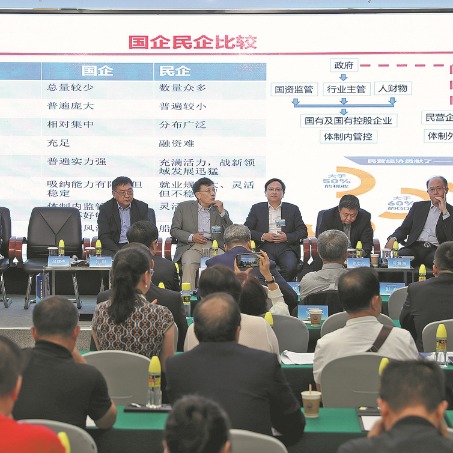



China's latest policy measures aimed at bolstering growth in the private economy and reforming State-owned enterprises will expand opportunities for private firms within the country, improving the overall economic landscape, according to scholars and business leaders.
Their comments came as the central government issued a 31-point guideline and 28 detailed measures to energize the private economy in July, promising to improve the business environment, enhance policy support and strengthen the legal guarantees for growth.
Private businesses have taken on an increasingly significant role in driving China's economic expansion, generating jobs and fueling technological advancements. As the private sector stabilizes, it is expected to provide assurance to China's economic growth, especially in the face of mounting downward pressures, said Zhang Fei, vice-president of the China Institute for Reform and Development based in Haikou, capital of Hainan province, at a sub-forum of the 89th International Forum on China Reform held in the city over the weekend.
Similar views were expressed by Yu Peili, deputy dean of Northeastern University's School of Business Administration in Shenyang, capital of Liaoning province.
"These efforts underscore China's unwavering commitment to providing a level playing field to both public and nonpublic sectors, rather than being perceived as a short-term remedy amid growth challenges."
Thanks to support provided by industrial upgrades and flexible marketing strategies, as well as the various free trade agreements signed between China and its trading partners, private Chinese companies saw their foreign trade value surge by 6.1 percent year-on-year to 16.34 trillion yuan ($2.23 trillion) — compared with 4.95 trillion yuan for State-owned enterprises — in the first three quarters of this year, accounting for 53.1 percent of the country's total import and export value, data from the General Administration of Customs showed.
Lyu Jianzhong, deputy director of the research center of China National Petroleum Corp, said that to better compete with major players from other countries, the government should expedite the optimization of State-owned economic layout and structural adjustments while further expanding the development space for private companies.
"SOEs should refrain from excessive expansion and instead create sufficient room for the growth of private businesses. There should be a restructuring of State-owned and private companies with complementary roles, deepening collaboration in supply chain and financial linkages," Lyu said.
He said that SOE mixed-ownership reform will help eliminate barriers that impede fair competition and industry ownership, with a focus on promoting the collaborative growth of both State-owned and private enterprises in emerging industries, such as high-tech manufacturing, new energy, new materials, artificial intelligence and biotechnology.
Mixed-ownership reform allows SOEs to incorporate nongovernmental capital, whether it originates from the private sector or foreign sources. This approach promotes the involvement of external strategic investors in the governance of SOEs, facilitating the infusion of both financial resources and fresh ideas, according to information released by the State-owned Assets Supervision and Administration Commission of the State Council.
Xu Huijun, a board member of Shenzhen Qingyunxuan Technology Co in Guangdong province, a private network technology service provider, said that in the minds of private business owners, traditional perceptions of the business environment have notably evolved.
While they no longer merely expect the government to provide them with good services, "they now hope for the government to help them fare better in their industrial transformation and global expansion", he said.
If you have any problems with this article, please contact us at app@chinadaily.com.cn and we'll immediately get back to you.